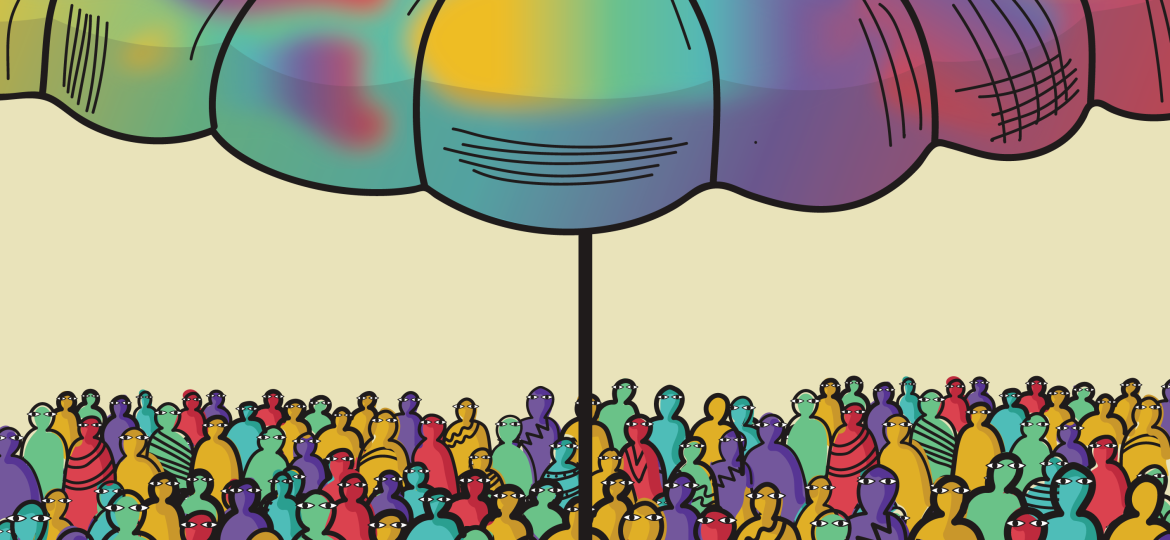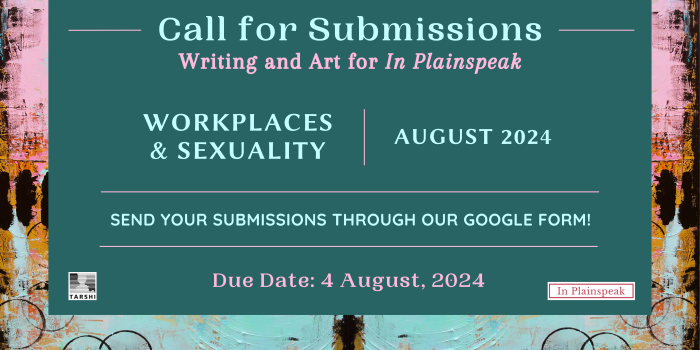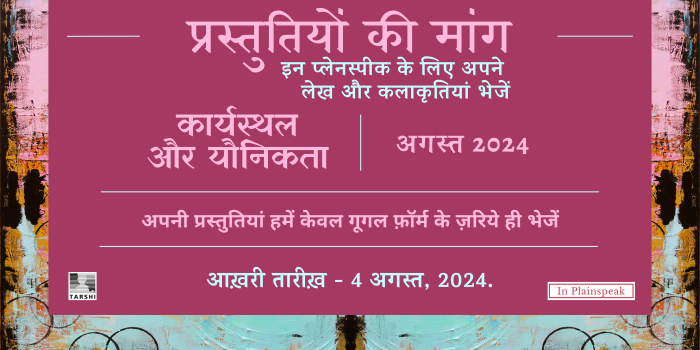
Queering is not about being queer but about doing queer – about going beyond binaries of gender and sexuality, questioning accepted perspectives, and challenging and upending normative ways of being in the world. It’s a frightening idea for some, because it puts into disarray all of societies’ carefully constructed artifices that have been ingeniously engineered for the power and pleasure of a privileged few. But it is precisely with that same promise of unruly disarray, that queering offers us the possibility of living life on our own terms, and of bending and twisting and even doing away with terms, so we can live in freedom, joy and true reciprocity.
And so, queering may be a way of life for people who do not identify as queer, as well as those who do, and it begins with another Q word – questioning. Questioning the ‘given order’ of things. With her usual brilliance, Suchitra Dalvie cuts to the chase, and asks incisive questions that test our assumptions about life’s possibilities. Suchitra explores multiple themes ranging across marriage, gender roles, violence, intersecting identities, marginalisation, comprehensive sexuality education, divorce, the ‘should’ stories we tell ourselves, and ends with AI, robots and erotic dolls.
Erotic dolls remind us of longing and that’s where we go next, though not with erotic dolls but with queering longing. Ketan Jain uncovers the hidden nooks and crannies in this terrain fraught with absence and yearning. As he beautifully reveals, through poetry and song as well as everyday examples, the queer art of longing has the potential to change our perspectives as well as disrupt our lives.
Life is unpredictable. Things happen, good things, bad things. Sometimes, there is much good that emerges out of difficult situations. Raju Behara discovered that though the pandemic and consequent lockdowns brought tribulation, they also brought an unexpected surprise by pushing people into finding resilience and solace in queering their existence. Apoorva Ravi writes a candid account of navigating the queer spectrum and her own journey of unfolding, emotional intimacy and discovery of self. As an educator, Riya Parikh creates safe spaces for children to see things in a different light and to talk about diversity in people’s ways of being.
We have two poems plus a bonus for you – audio tracks of the poets reading their poems! Aakanksha Ahuja lovingly enumerates the queer possibilities that she wants to be for the people in her life. “To be” – two little words, but they are words of such power, of so much promise. Anjum, in Sara Haque’s poem of the same name, is a powerful eruption of rebellion and joy, a consummation of a promise.
In Hindi, we have two translations, both about language, but from different perspectives. The first is a translation of an anonymous contributor’s article The Absence of a Queer ‘Mother Tongue’ on the difficulties of finding words to talk about queer existence in regional languages. The second is a translation of Aditi Padiyar’s article Yaarana: Befriending Queer Literature and Hoshang Merchant on learning to normalise non-binary narratives.
Finally, check out Quick Bytes to see what our respondent Tejaswi Subramanian has to say on Queering as a Way of Life.
Go in peace. Go in strength.
In the July issue of In Plainspeak, our contributors point to how queering as a way of life may call for, as well as call forth, courage, persistence, rebellion, subversion, just as much as it may breathe and thrive on simple acts of kindness that friends, and sometimes strangers, generously share.
Ankur Paliwal, founder of queerbeat.org, speaks to Shikha Aleya in a candid, straight-from-the-heart interview about what queering means to him, the time he used to carry slips of paper that reminded him to “walk like a man”, and why he does what he does today, to make the world less unequal.
To make our world more liveable, we do what we can, and are sometimes surprised by hope. The gap between the utopia that beckons and the now that we inhabit with all its, and our, failures, is a wound that Cat D gently peels the bloodied bandages off and tends to, through queering and transing as daily political acts.
Some people start young, and we have companion pieces from a daughter-mother duo. Aradhana Phadke Sardesai, a 9th grader, writes about her experiences in unqueer classrooms in school, and what queering as a way of life means to her. She seems to have got it right. Of course, it helps that she is the daughter of a mum who puts feminism into practice, in parenting, as in life. Or at least tries to. Mum, Shilpa Phadke, reveals with disarming honesty the desires and doubts, and the challenges that society and a questioning child pose to a feminist trying to queer parenting. Walking the talk as Shilpa has discovered, encouraged, egged on, confronted and resisted by her daughter, is a work in progress.
Another work in progress, language, as a means of communication and building cohesion, is often perversely used as a tool of prejudice. Andy Stephen Silveira claims and queers words in his native Konkani to transform them from weapons of offence and derision into colourful pennants of inclusion and pride.
We all want to feel we belong and are accepted. “For many of us, coming out in our 20s, 30s or beyond feels like stepping into a world that was always there but just out of reach” muses Srividya Mehendale, and goes on to outline sources of support and affirmation for a queer second adolescence.
Lipun Kumar Sanbad highlights the theoretical foundations and practical applications of queering across the dimensions of politics, power and privilege to show how it can contribute to a more just and liberated world.
While we look to justice and liberation, Siddharth Narrain identifies three thematic changes that have taken place globally, over the last seven years, which have impacted our understanding of sexuality, technology and the Internet. Poor scores here for justice and liberation.
In our film review section, ElsaMarie D’Silva takes us to the 1920s with Wicked Little Lies to show how, when scandal erupts, prying eyes and peeping Toms are ready to scapegoat anyone who seems just a bit ‘different’. So true today as well!
In Hindi, we bring you a translation of Nighat Gandhi’s article on spinning straw into gold, on the puzzle of what the true self really is, and what it takes to be sexually, spiritually queer.
Earlier this month, on July 9, we hosted a webinar with Abhishek Anicca and Srinidhi Raghavan, two brilliant speakers (and In Plainspeak contributors) who engaged with us in a conversation on queering as a way of life and focussed on the intersections of disability and sexuality. Watch a recording, and check out responses to a poll we conducted on the question “What does queering mean to you?”
Before we go, here’s an important announcement. We’re celebrating change at TARSHI! Please join us in welcoming Ramya Anand and Vani Viswanathan as Co-Leads of the organisation from July 15, 2024. With their appointment, TARSHI is formally adopting a co-leadership model that is aligned with our work ethos and feminist values. To learn more, please click here.
That’s it from us for now. Go gently. Spread kindness. It’s an act of queering in today’s world.


Cover Image: Barabar Design